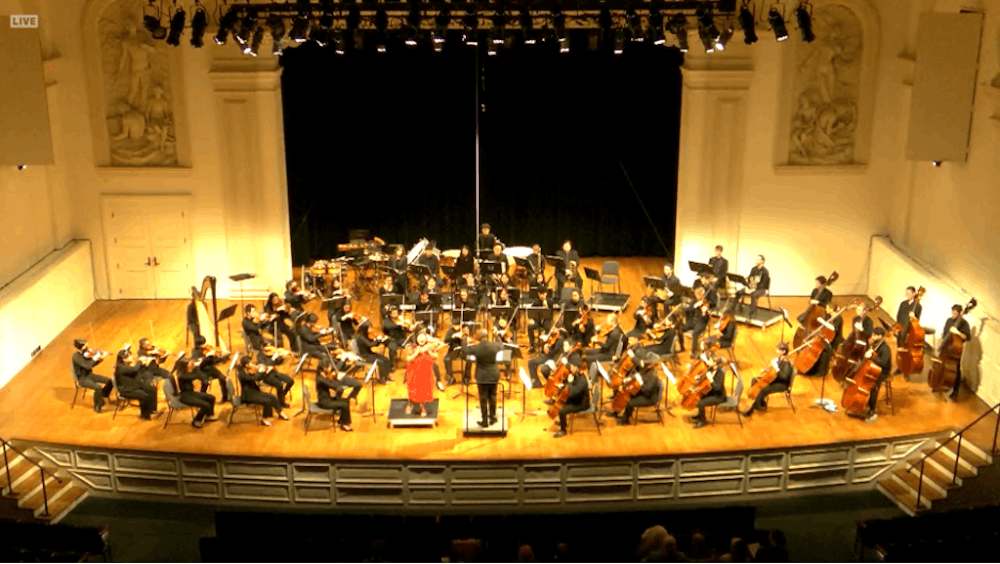On the evening of Feb. 5, the Peabody Symphony Orchestra (PSO) gave a concert in Friedberg Hall in Mt. Vernon. The orchestra is the largest of all the Peabody Institute ensembles, and the concert was free to attend. They played Jessie Montgomery’s Soul Force, Richard Strauss’ Sechs Lieder “Brentano Lieder,” Op. 68 and Ludwig van Beethoven’s Symphony No. 7 in A major, Op. 92.
Even though I was watching the live-streamed concert from home, I still felt a growing excitement when I opened the video and heard the cacophony of warm-up as the musicians waited for the concert to begin. Through the wall of noise, I could hear bits and pieces of the melodies they were practicing, like a little preview of what the concert would entail.
The first piece was Soul Force. This is a contemporary work, composed in 2015 by Jessie Montgomery. Her website describes the piece as “a one-movement symphonic work which attempts to portray the notion of a voice that struggles to be heard beyond the shackles of oppression.”
The piece began with a fierce burst of sound from the percussion section and was followed by silence. I was already leaning forward in my seat. There came another burst of beating percussion. And then, silence. Rising mournfully from another part of the orchestra, a lone wind player played a long, legato phrase. The percussion answered, again with a snappy and explosive rhythm. The winds and percussion went back and forth in an enrapturing dialogue, and I could really feel the tension between a single pained voice and an overwhelming, oppressive force.
After this exchange, the rest of the orchestra came in, and I was astounded. I could immediately hear that there was something special about this ensemble that I’d never heard before in a student group. In contrast to the other student groups I’ve heard, the PSO had extraordinary control and cohesiveness in the quality of their sound. I could hear an extra layer of texture and complexity in the phrasing of the music with an unusual precision in sound and intention that one usually only hears in professional settings.
I’d say that Soul Force was my personal favorite piece of the night. It had this incredible blend of tension and anxiety with a soothing, peaceful vibe. I’d never heard of the composer before, and it’s always great to be exposed to music outside of the typical orchestral canon, especially by highlighting a present-day, female composer of color.
This first piece was conducted by Juliano Aniceto, an assistant conductor at Peabody who also conducts for the Hopkins Concert Orchestra at Homewood Campus. The rest of the concert was conducted by Joseph Young, the Ruth Blaustein Rosenberg artistic director of ensembles.
The second piece was the Sechs Lieder by Strauss, consisting of six songs for orchestra and soprano with lyrics by the German poet Clemens Brentano. The soloist for this piece was Helena Colindres, a soprano who recently graduated from Peabody with a Master of Music in Voice with an emphasis on pedagogy.
When they began to sing, I couldn’t believe the strength in their voice. Despite being accompanied by an entire orchestra, they were able to completely hold their own, beautifully carrying the melody with all the drama and power that Strauss demands. The longer notes were held out with a lush, rich vibrato. The faster phrases were perfectly precise and in tune, while still carrying immense emotion.
The Sechs Lieder is not a short piece by any means. I was thoroughly impressed that the quality and clarity of sound was just as beautiful, if not better, during the last movement as it was during the first. When they finished the piece and started leaving the stage with the conductor during the crowd’s thunderous applause, they only made it about two-thirds of the way to the exit before Young shooed them back to the center of the stage for another well-deserved bout of bows.
The final piece of the evening was Beethoven’s Symphony No. 7. It’s a triumphant, optimistic piece, and I felt that this was the piece where the orchestra got to shine the most. I especially loved the way that, when there were repeated motifs that got passed between sections, you could tell that the musicians were listening to each other and consciously matching the quality of each other’s sound. The final two movements were especially fast-paced and lively, but, even then, the clarity of notes was always carefully maintained by the musicians.
The concert ended with a standing ovation from the audience. While attending live-streamed concerts has the advantage of allowing one to dance around their bedroom without judgment from other concertgoers, I still sincerely regret that I wasn’t able to attend the concert in person.
It was only after the concert was done, and I saw the musicians chatting and laughing and taking group pictures together that I remembered that they were students. This concert was at a similar level to the professional orchestral concerts I’ve seen. The next time they put on a performance, I highly recommend hopping on the JHMI shuttle and taking the opportunity to witness their incredible musicianship.





